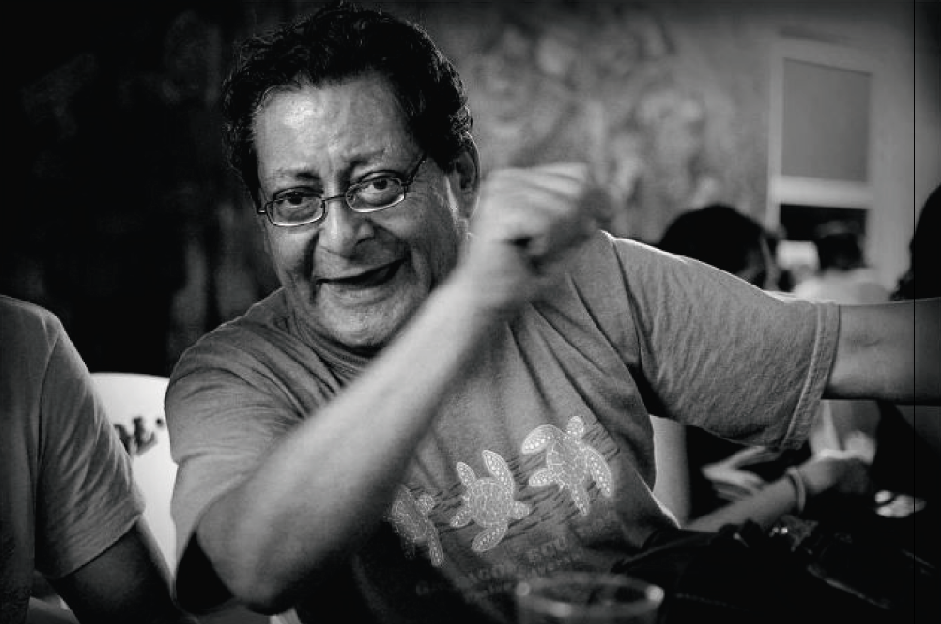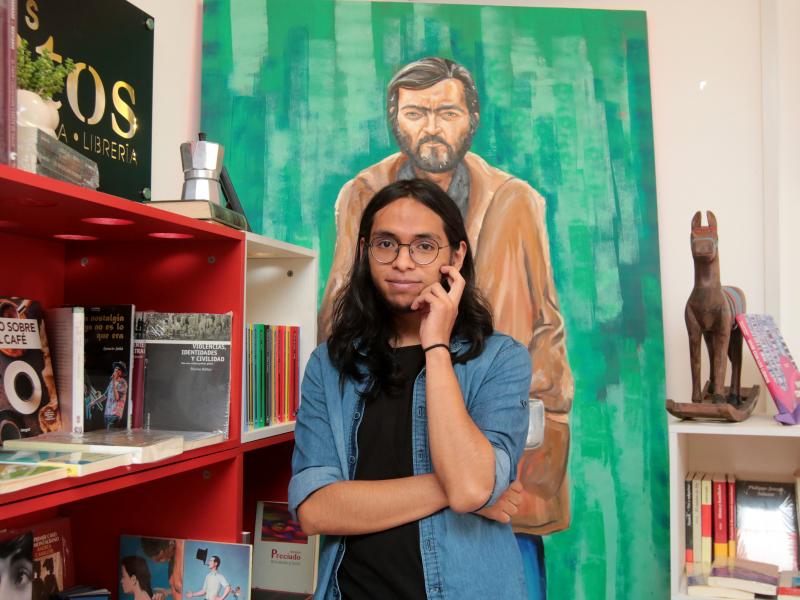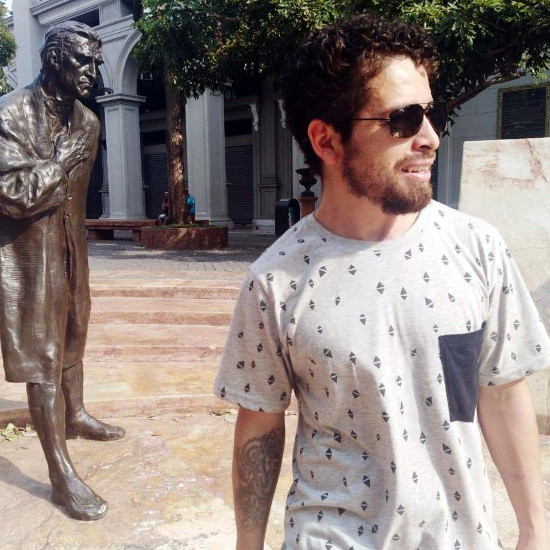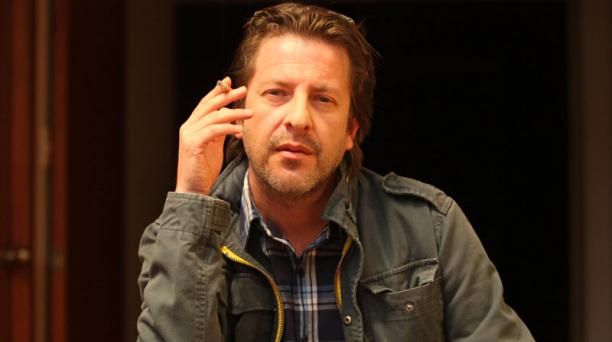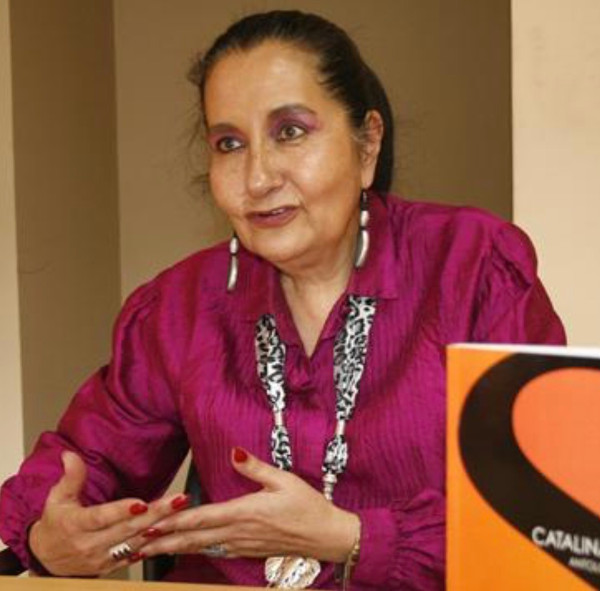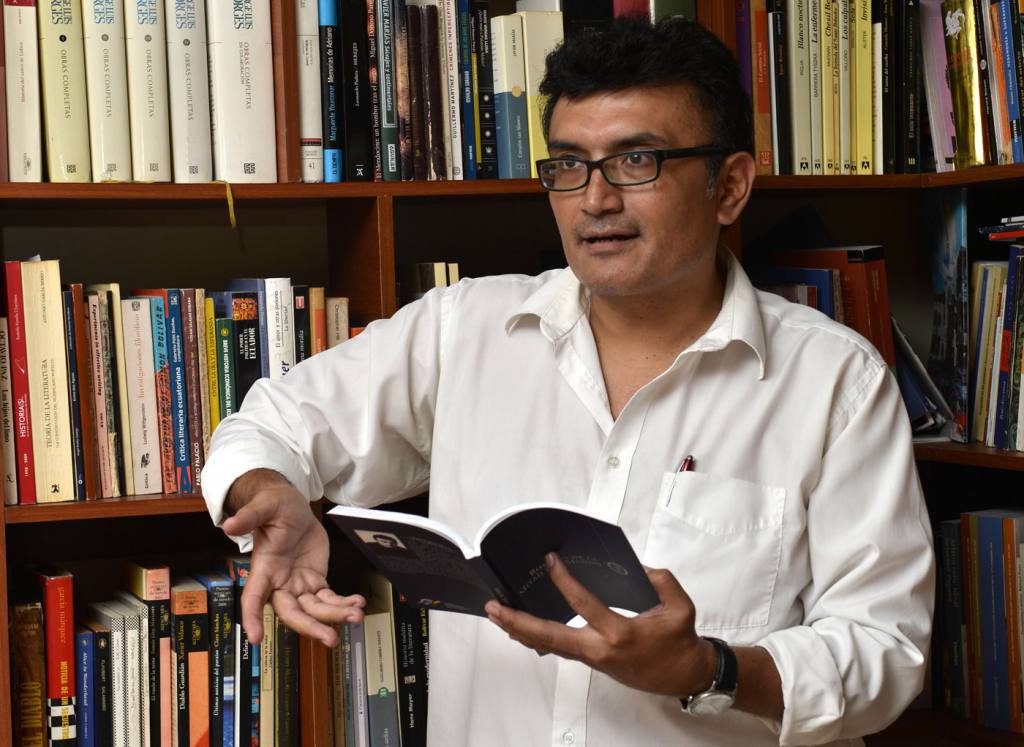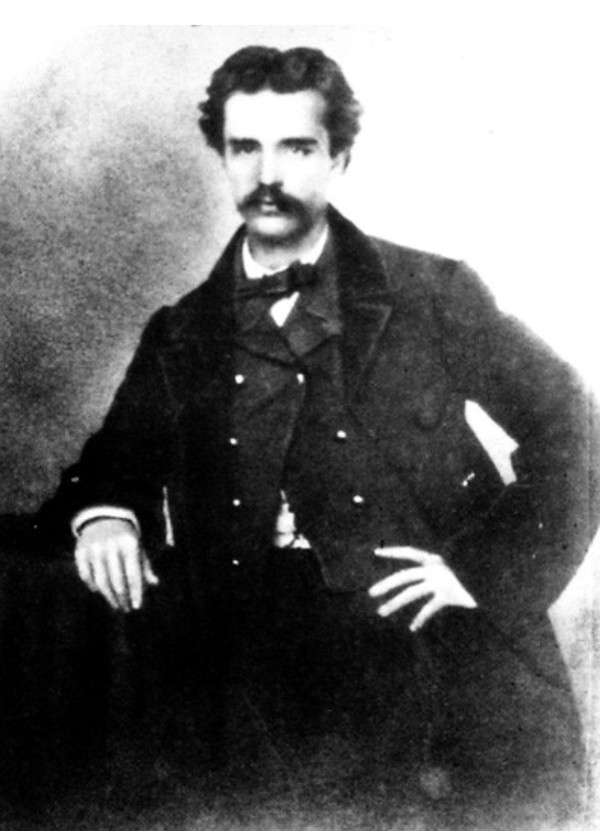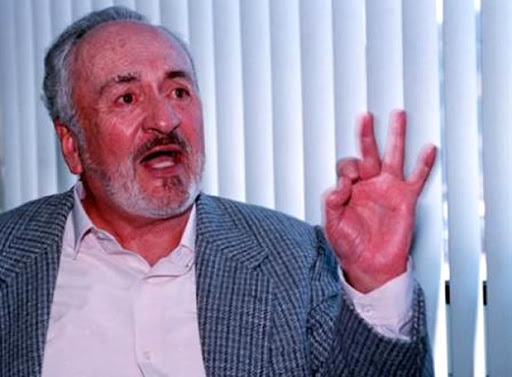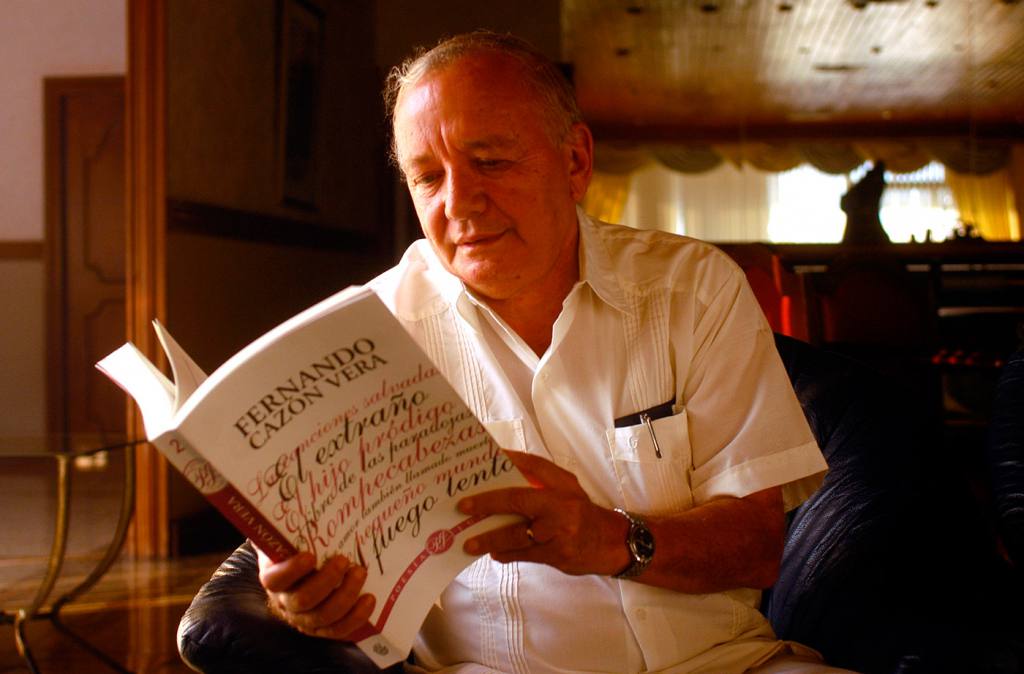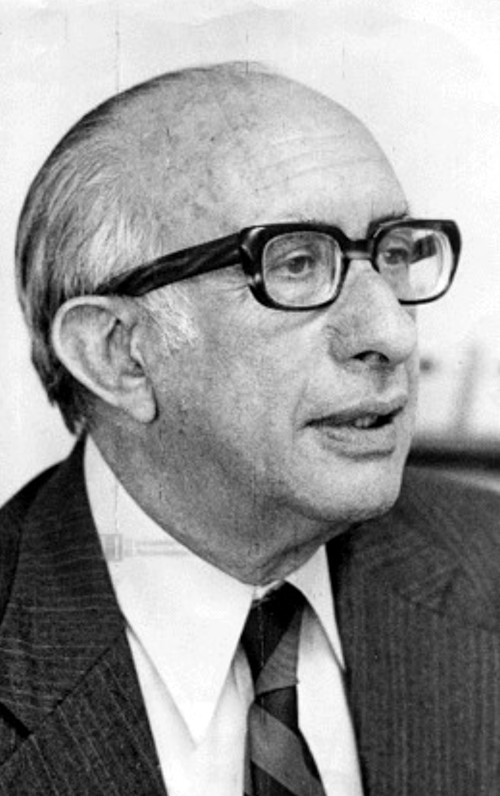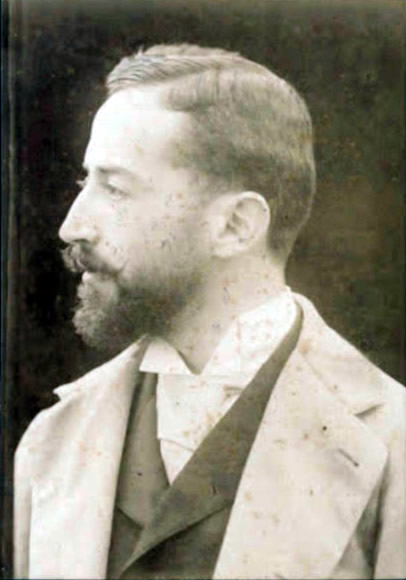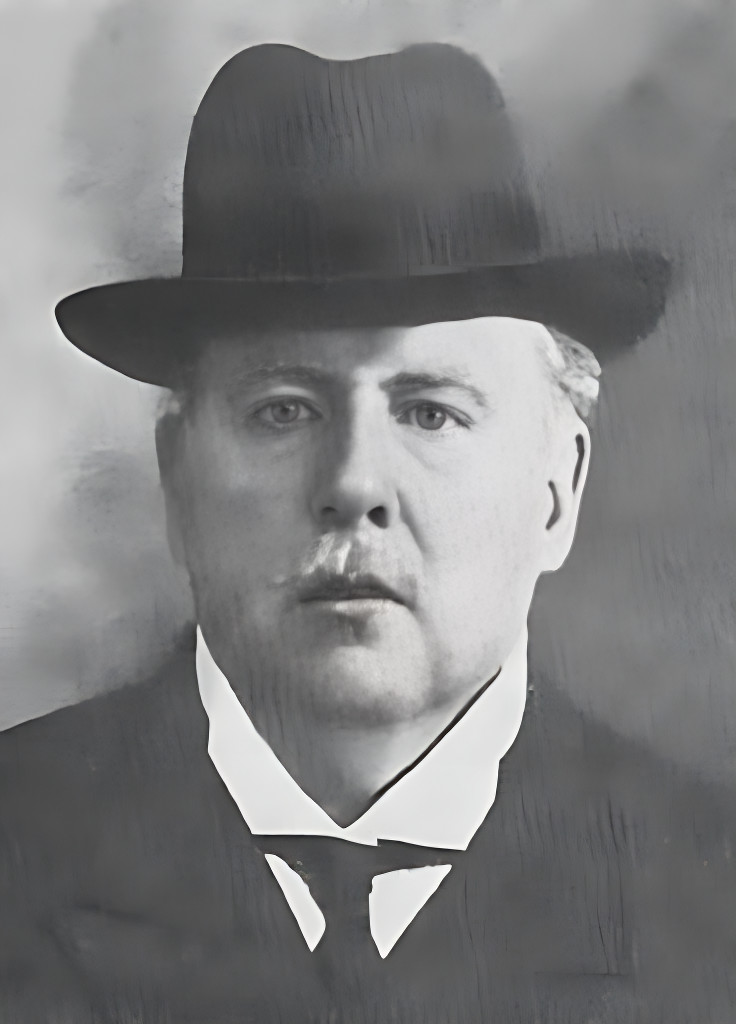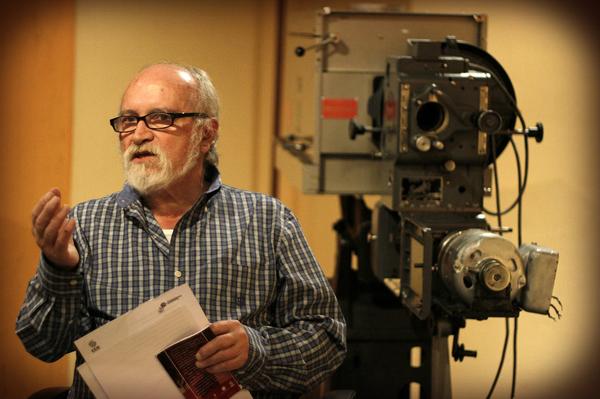Fernando Nieto Cadena (Quito, March 29, 1947 – Villahermosa, Mexico, March of 2017) was an Ecuadorian poet. In the 1970s he founded the literary group Sicoseo, which consisted of writers such as Fernando Artieda, Jorge Velasco Mackenzie, Jorge Martillo and Raúl Vallejo. In 1978 he moved to Mexico, returning to Ecuador on only two occasions. In 1989 he was awarded the Jorge Carrera Andrade Prize for his poetry book “Los des(en)tierros del caminante.”
Continue reading “Fernando Nieto Cadena”Category: Poets
Leira Aráujo Nieto
Leira Aráujo Nieto (Guayaquil, 1990) is an Ecuadorian poet, writer, screen writer, actress, literature professor, and researcher. In 2015 she published her first poetry book, “Caníbales.” That same year her poetry collection, “Última noche en el país de los hoteles,” won the Ileana Espinel Poetry Prize. Her poems have been published in various national and international anthologies. She earned a PhD in Spanish Language and Literature from the University of Granada (Spain). She currently lives in Granada, Andalusia, Spain.
Continue reading “Leira Aráujo Nieto”Josué Negrete
Josué Negrete is a poet from Quito, Ecuador. In 2020 he won the Ileana Espinel Poetry Prize for his book Bajo las ramas que caen, caen, caen.
.
Edwin Augusto Paredes
Edwin Augusto Paredes Paredes is an Ecuadorian poet. He was born in Loja 1988. His poetry has appeared on blogs, online magazines and national and international anthologies. In 2019 the House of Ecuadorian Culture, Loja chapter, published his book Vacuidad. In 2018 his poetry book Génesis del polvo won the Ileana Espinel Cedeño National Poetry Prize.
Continue reading “Edwin Augusto Paredes”Cristóbal Zapata
Cristóbal Zapata is an Ecuadorian poet, editor, literary critic, and art curator. He was born in Cuenca in 1968. He is currently the executive director of the Municipal Biennial Foundation of Cuenca. He has published the poetry books Corona de cuerpos (1992), Te perderá la carne (1999), Baja noche (2000), No hay naves para Lesbos (2004), Jardín de arena (2009), La miel de la higuera (2012) and El habla del cuerpo (2015); and the book of short stories El pan y la carne (2007), which won the prestigious Joaquín Gallegos Lara National Literature Prize.
Continue reading “Cristóbal Zapata”Catalina Sojos
Catalina Sojos Mata (Cuenca, 1951) is a poet, writer, columnist, author of children’s literature, and a translator. In 1989, at the age of 37, she published her first poetry book: Hojas de poesía. She has been awarded the Gabriela Mistral National Poetry Prize, 1989, and the Jorge Carrera Andrade Prize, 1992. She is currently the director of the Manuel A. Landívar Museum in Cuenca, Ecuador.
Continue reading “Catalina Sojos”Solange Rodríguez
Solange Rodríguez Pappe (Guayaquil, Ecuador, 1976) is an Ecuadorian writer and professor known for her short fiction in the genres of fantasy, horror, and the strange. She has published several acclaimed collections, including Balas perdidas (2010), which won the Joaquín Gallegos Lara Award for Best Storybook of the Year. A longtime educator, Rodríguez has also been honored with the Matilde Hidalgo Prize for her academic career. Her works often explore themes of the fantastic and macabre, and have been translated into multiple languages, gaining international recognition.
Continue reading “Solange Rodríguez”Luís Carlos Mussó
Luís Carlos Mussó (Guayaquil, March 17, 1970) is an Ecuadorian poet and novelist. His first novel Oscurana (2012) won the Felicísimo Rojas Literary Prize and the Joaquín Gallegos Lara Prize. His latest novel Teoría del manglar (2018) is a work that follows the structure of the periodic table of elements and deals with the death of his father. Among his 8 poetry books, Tiniebla de esplendor (2006) and Mea Vulgatea (2014) have won the prestigious Jorge Carrera Andrade Award.
Continue reading “Luís Carlos Mussó”Julio Zaldumbide Gangotena
Julio Zaldumbide Gangotena (Quito, June 5, 1833 – Ibarra, July 31, 1887) was an Ecuadorian poet and politician, recognized as one of the leading figures of 19th-century Romanticism in Ecuador. He began his literary career in 1852 with La Estrella de la Tarde and became known for his contemplative, nature-focused poetry, blending melancholic and philosophical themes. He was also involved in politics, serving as a Deputy and later as Minister of Public Instruction, where he advocated for liberal ideals. He was a founding member of the Ecuadorian Academy of Language. His works were posthumously collected and remain integral to Ecuadorian literature.
Continue reading “Julio Zaldumbide Gangotena”Francisco Granizo Ribadeneira
Francisco Granizo Ribadeneira (Quito, November 8, 1925 – January 21, 2009) was an Ecuadorian poet, professor and diplomat. He was a professor at Ecuador’s Central University and the director of the House of Ecuadorian Culture’s radio station. He published several poetry books, including “Por el breve polvo” (1948), “La piedra” (1958), “Nada más el verbo” (1969), “Muerte y caza de la madre” (1978), “Sonetos del amor total” (1990) and “El sonido de tus pasos” (2005). He also wrote a verse drama, “Fedro” (2005). In 2001, he published his only novel, “La piscina,” for which he received the Joaquín Gallegos Lara Prize for best novel of the year. Through the protagonists Fernando and Lilí, the book examines loneliness and the impossibility of finding love, two frequent themes in Granizo’s works.
Continue reading “Francisco Granizo Ribadeneira”Fernando Cazón Vera
Fernando Cazón Vera is an Ecuadorian poet, columnist, editor, and university professor. He was born in Quito on June 5, 1935 and has lived in Guayaquil most of his life. He comes from a family of well-known cultural figures in Ecuador, including his uncles Pedro Jorge Vera (1914-1999), who was an acclaimed writer, and Alfredo Vera Vera (1910–1999), who as Minister of Education promoted the establishment of the House of Ecuadorian Culture in 1944, in addition to his cousin Noralma Vera (1936-), an important figure of the Ecuadorian ballet. His first book of poetry, “Las canciones salvadas,” was published in 1957 by the House of Ecuadorian Culture after being read and championed by the organization’s founder, Benjamn Carrión. He has worked as a columnist or editor for newspapers and magazines such as La Hora, Expreso, Extra, La Nación, and La Razón for more than 50 years. He was twice president of the House of Ecuadorian Culture’s Guayas chapter. President Lenin Moreno bestowed Ecuador’s highest honor, the Eugenio Espejo Award in Literature, on Cazón in 2018.
Continue reading “Fernando Cazón Vera”Alejandro Carrión Aguirre
Alejandro Carrión Aguirre (Loja, March 11, 1915 – Quito, January 4, 1992) was an Ecuadorian poet, novelist and journalist. He wrote numerous poetry books, short story books, and the novel La espina (1959). As a journalist he published many articles under the pseudonym “Juan Sin Cielo.” He was the nephew of the writer Benjamín Carrión and the naturalist Clodoveo Carrión. He was a recipient of the Maria Moors Cabot Prize (1961) from the Columbia University Graduate School of Journalism. He also was awarded the Eugenio Espejo Award (1981), Ecuador’s highest literary honor.
Continue reading “Alejandro Carrión Aguirre”José Trajano Mera
José Trajano Mera Iturralde was an Ecuadorian poet, playwright and diplomat with a literary and cultural heritage. He was born in Ambato in 1862 and died in Guayaquil in 1919. His father was the famous author Juan Leon Mera who wrote Ecuador’s first novel Cumanda (1877) and the Ecuadorian national anthem (1865). Trajano earned a degree in jurisprudence from the Central University of Ecuador. He died in Guayaquil in 1919 while holding the position of Undersecretary of the Ministry of Foreign Relations.
Continue reading “José Trajano Mera”José María Egas
José María Egas (Manta, November 28, 1897 – 1982) was an Ecuadorian poet, lawyer, journalist and university professor. Many of his poems have been turned into the lyrics of “pasillos,” a genre of music very popular in Ecuador. Egas studied law at the University of Guayaquil, graduating in 1927. He was then active as a lawyer and journalist, but became best known for his poetry, being appointed national poet laureate in 1976. His poem “Plegaria Lírica” has appeared in several American and European Anthologies and is reproduced every year in “The Hundred Best Poems in the Spanish Language,” which is published in Madrid, Spain. Egas worked as a professor at the University of Guayaquil. He was the brother of the poet Miguel Augusto Egas, best known by his pen name Hugo Mayo.
Continue reading “José María Egas”Ulises Estrella
Ulises Estrella Moya was an Ecuadorian poet, writer, professor and film expert. He was born in Quito on July 4, 1939 and died in the same city on December 27, 2014. In 1962, together with Marco Muñoz he co-founded Tzantzismo, a cultural movement of 1960s Ecuador, whose members had a revolutionary attitude and which was mainly expressed in poetry, and to a lesser extent in stories and theater. Estrella directed the film department of the House of Ecuadorian Culture for over 30 years. Among his best known works are: Clamor (1962), co-written with the Argentinian writer Leandro Katz, which marked the beginning of Tzantzismo, and Fuera del Juego (1983), winner of the Jorge Carrera Andrade Prize, Quito.
Continue reading “Ulises Estrella”
